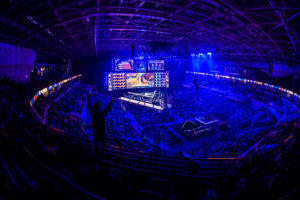eSports is expected to be a $2.9 billion industry by 2017. Not surprisingly, the niche is weathering growing pains — and players are bearing the brunt. With that in mind, let’s review some eSports law issues affecting players.
eSports Law: Venue Control
Unfortunately, a large chunk of eSport-related profits are derived from privately controlled event venues. Since teams and individual gamers don’t have a stake in the arenas, they typically miss out on merchandising, concession, ticketing, and broadcasting revenues.
How can teams and players combat this arguable inequity? By making a concerted effort to protect whatever income they do control — like endorsements and sponsorships. Without doing so, players and teams may never enjoy the thing they deserve — consistent income. Other professional athletes are well-compensated. So should be the case for cyber athletes.
Intellectual Property
Game publishers and commercial organizations typically own and control intellectual property (IP) born out of the eSports industry — especially when it comes to tournaments and leagues. Generally speaking, game-related-IP for players is limited. Unlike traditional sports teams and clubs, which usually copyright and trademark and license IP, eSports teams and organizations still haven’t gotten that far. For instance, individual gamers don’t usually own their avatars. However, a few professional gamers have been able to successfully protect and exploit their online handles.
Endorsements and Sponsorships as Revenue Streams
Currently, the most reliable income for players are endorsements and sponsorships. Contracts for such partnerships must explicitly outline ROI expectations and scope parameters. If executed sloppily, gamers’ rights issues tend to rear their ugly heads. Furthermore, the agreements mustn’t be open-ended or overly restrictive (i.e., locking up teams and players for excessive periods of time. Otherwise, cyber-athletes will have to choose between a flexible approach, which leaves open the possibility for future profits, versus more secure income avenues, in exchange for less flexibility.
Additional eSport Legal Issues
eSports are a global phenomenon. As such, it’s sometimes difficult to determine which country’s laws govern a given event or contract. As more cases hit the courts, laws and precedents regarding eSports will become clearer. However, many players may lack access to international courts, and this should be addressed in endorsement and sponsorship agreements.
eSports Law: A Look At The Months Ahead…
A wide array of high-profile events are coming up in eSports in 2016. The trend is only expected to intensify over the next several years. Considering how much money is being generated, it’s easy to see why. It would be a real shame if the organizations and companies — not the teams and players — are the only ones who stand to profit. Let’s all hope that players and teams develop the ability to go to bat for themselves and ensure that they aren’t left out.


Leave a Reply
Your email is safe with us.